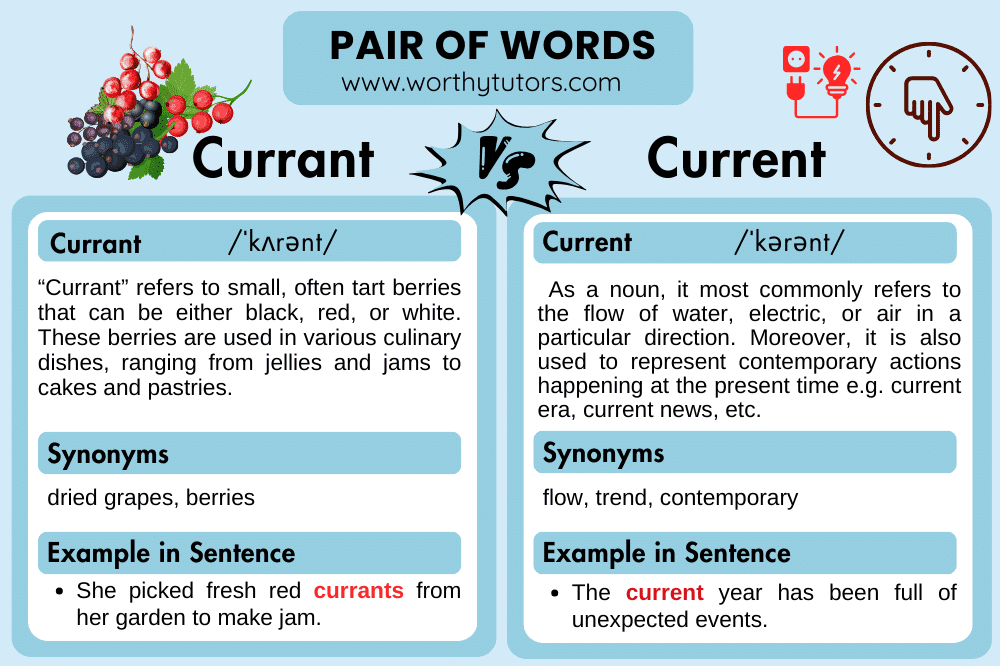
Differences Between “Currant” and “Current”
The words “current” and “currant” are homophones, which means they sound the same but have different meanings and spellings. This article will dissect these terms, providing a clear understanding of their pronunciation, synonyms, meanings, usage, examples, and a conclusion.
Currant
Pronunciation of Currant
The word “currant” is pronounced as /ˈkʌrənt/.
Meaning of Currant
“Currant” refers to a small dried grape, often used in baking or cooking. It can also denote the small, edible berry of certain shrubs.
Etymology and Explanation of Currant
The term “currant” traces its origins to the Old French word “corinthe” and the Latin word “corinthium,” named after the city of Corinth in Greece. Initially, it referred to small dried grapes, but over time, it also came to denote the berries of specific shrubs.
Currant refers to small, often tart berries that can be either black, red, or white. These berries are used in various culinary dishes, ranging from jellies and jams to cakes and pastries. The word “currant” is derived from the berry-producing shrubs of the genus Ribes. In addition to their use in cooking, currants are also appreciated for their nutritional value, being rich in vitamins and antioxidants.
Synonyms of Currant
Synonyms for “currant” include:
- Dried grape
- Berry
Examples of Currant in Sentences
- Currants are a popular ingredient in traditional English scones.
- She preferred red currants over black for making jelly.
- The recipe called for a cup of dried currants.
- She picked fresh red currants from her garden to make jam.
- Currants have been used for medicinal purposes for thousands of years.
Current
Pronunciation of Current
The word “current” is pronounced as /ˈkərənt/.
Meanings of Current
“Current” has several meanings, including:
- The flow of water or air, such as in a river or electrical circuit.
- Existing or occurring at the present time.
- A trend or prevailing tendency.
Synonyms of Current
Synonyms for “current” include:
- Flow
- Trend
- Contemporary
Etymology and Explanation of Current
The term “current” originates from the Latin word “currere,” meaning “to run.” It signifies the movement of something, whether it’s water, air, or trends in society.
The term “current” has multiple applications in English. As a noun, it most commonly refers to the flow of water or air in a particular direction. This can be seen in phrases like “ocean current” or “air current,” where it denotes the continuous movement of these elements. Another significant use of “current” as a noun is in the context of electricity. Here, it describes the flow of electric charge through a conductor, an essential concept in physics and electrical engineering. The word “current” also functions as an adjective, where it describes something that is happening now or is in general use. For instance, one might talk about “current events” or “current trends,” indicating their relevance to the present time.
Examples of Current in Sentences
- The current in the river was too strong for swimming.
- The current year has been full of unexpected events.
- The river’s current was too strong for the small boat.
- Keeping up with the current technology is essential in the IT industry.
- The electrician warned about the dangers of a live current.
Summary
While “current” and “currant” may sound the same, their meanings serve different purposes. “Current” relates to the present time or a flow of some sort, while “currant” refers to a type of fruit. Understanding these differences is key to using them correctly in both speech and writing.
Fill in the Blanks Exercise
- _______ affairs are discussed in the newspaper every morning.
- I bought some dried _______ to add to my oatmeal cookies.
- The _______ in the river was too strong for swimming.
- _______ fashion trends focus on sustainability and ethical practices.
- She harvested fresh red _______ from her garden to make jam.

About Authoress
Mahnoor Jehangir is a seasoned educator and linguist, specializing in English language and literature. With a master’s degree in English and applied linguistics, Mahnoor serves as a subject lead, while also indulging her passion for writing, exploring the nuances of language and storytelling.